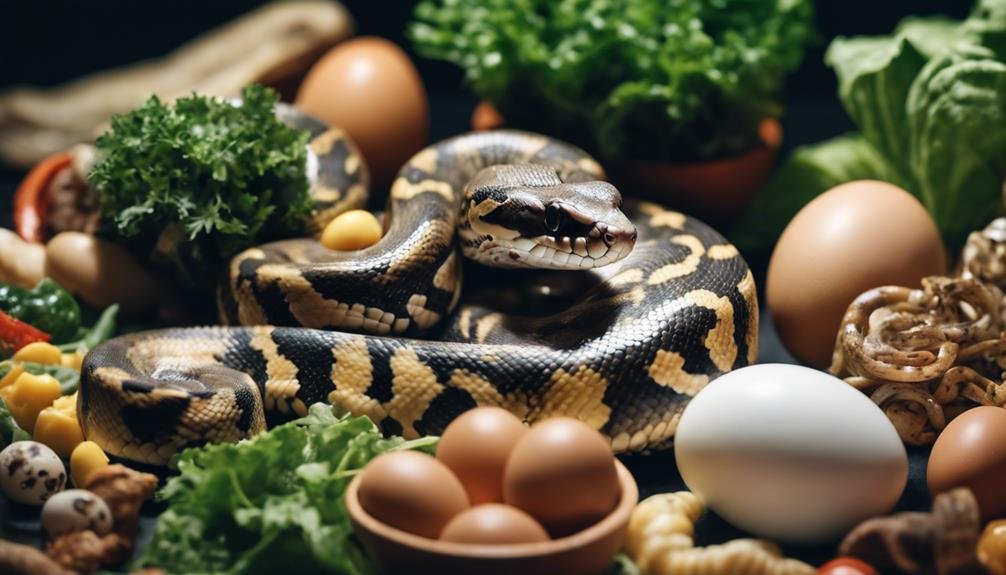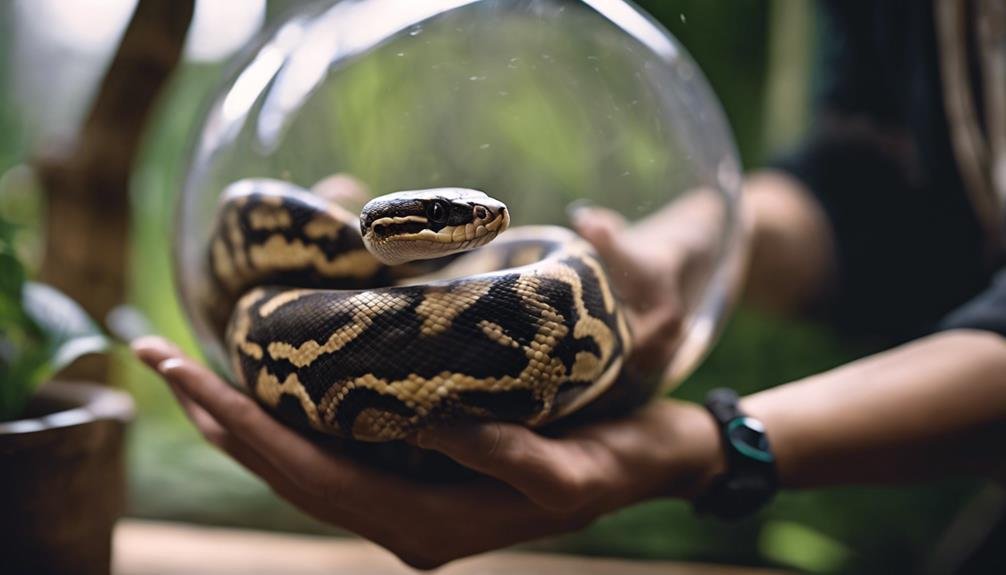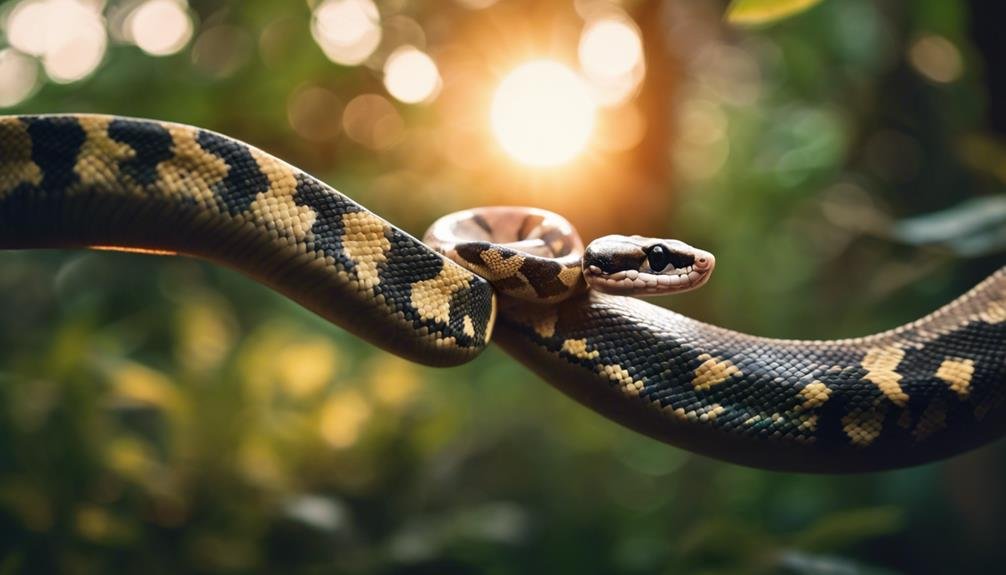You might be surprised to learn that your ball python could live as long as a small dog or cat, with lifespans stretching into the 30s when you provide the right care. The secret isn't just about what you're feeding them or the size of their enclosure, but a combination of factors that contribute to their overall well-being. From the temperature gradients in their habitat to the frequency of their meals, each detail plays a vital role. If you're curious about how to extend the life of your slithery friend, understanding these components is just the beginning.
Key Takeaways
- Ball pythons typically live for 20 to 30 years in captivity, with potential to reach their 30s and 40s with optimal care.
- A balanced diet, including appropriately sized rodents, is crucial for their longevity.
- Maintaining a thermal gradient with a hotspot of 88-96°F and cooler areas around 78-80°F supports their health.
- Regular veterinary check-ups are essential for early detection and treatment of health issues.
- Providing enrichment through climbing branches, hiding spots, and regular handling can improve their quality of life and lifespan.
Understanding Ball Python Lifespan
In order to fully grasp how long ball pythons can live, it's important to take into account several key factors such as their care, genetics, and environment. Known also as the royal python, this species has become a popular pet due to its docile nature and relatively easy care requirements. However, the lifespan of these creatures isn't just a matter of chance. It's shaped by the quality of care they receive, their genetic background, and the environment in which they're kept.
An important thing to remember is that while ball pythons can live for 20 to 30 years on average in captivity, with proper care and husbandry, their lifespan can extend well into their 30s and sometimes even their 40s. This includes providing them with an appropriately sized habitat (though specifics will be covered more in 'Optimal Habitat Conditions'), a balanced diet, and regular veterinary check-ups. These actions can have a significant impact on their longevity. Genetics also play a role, but with attentive care, even ball pythons from less than ideal genetic backgrounds can live long, healthy lives.
Optimal Habitat Conditions
To guarantee your ball python thrives, providing ideal habitat conditions is essential, including a well-maintained thermal gradient and appropriate hiding and climbing spaces. Ball pythons can live up to 30+ years in captivity when their environment is perfectly tailored to their needs.
A critical aspect of this environment is maintaining a proper thermal gradient. You'll need to make sure a hotspot temperature of 88-96°F, where your snake can bask, and an ambient temperature around 78-80°F for the cooler parts of their enclosure. This gradient allows them to regulate their body temperature effectively, which is essential for their digestion and overall health.
Incorporating hiding spots and climbing branches not only adds to the visual appeal of the habitat but also provides essential mental stimulation for your ball python. These features mimic their natural environment, encouraging natural behaviors and reducing stress.
To manage these conditions, a reliable heat source, coupled with a thermostat, is non-negotiable. It's not just about providing warmth; it's about ensuring the temperature remains consistent without any dangerous fluctuations. By meeting these habitat requirements, you're setting the stage for a long, healthy life for your ball python.
Nutritional Requirements


Just as you'd focus on creating the perfect habitat, paying attention to your ball python's diet is essential for its longevity and health. Meeting your snake's nutritional needs involves providing a diet that's rich in proteins, fats, vitamins, and minerals. In captivity, this primarily means feeding them appropriately sized rodents, with rats often being the go-to choice due to their ideal nutritional content for your python's growth and development.
For adult ball pythons, it's important to establish regular feeding schedules, typically every 7-10 days, to maintain their health without overfeeding. This routine supports their nutritional requirements while mimicking their natural eating habits. However, determining the right size and type of prey can be tricky. It's essential to consult with a reptile specialist who can offer guidance on suitable prey items and feeding schedules tailored to your snake's specific needs.
Importance of Veterinary Care
Regular veterinary check-ups are essential for catching and treating any health issues your ball python may face early on. By consulting with a reptile veterinarian, you're ensuring that any potential problems are identified and addressed before they become serious. These specialists can guide you on vaccinations and parasite prevention measures, which play an important role in maintaining your snake's health over the years.
Moreover, the advice from a reptile veterinarian goes beyond just health concerns; they can also offer insights on creating a safe and nurturing environment. Proper setup safety, including the use of smooth-surfaced water bowls and secure enclosures, is crucial. These precautions help prevent injuries and infections, contributing significantly to the well-being of your pet.
Can the lifespnan of a ball python be affected by its eating habits?
Yes, the lifespan of a ball python can be affected by its eating habits. Proper ball python feeding habits, including a balanced diet and appropriate portion sizes, are crucial for their overall health and longevity. A diet that is too large or too small can lead to obesity, malnutrition, and various health issues.
Enrichment and Handling Practices


Incorporating enrichment activities and handling practices into your ball python's routine can greatly enhance their mental and physical well-being. By integrating elements that mimic their natural habitat, you're not only providing a more stimulating environment but also encouraging natural behaviors that are important for their health.
Here are four key ways to enrich your ball python's life:
- Introduce climbing branches to increase the surface area for exploration and exercise. This not only simulates their natural environment but also promotes muscular development and mental stimulation.
- Implement a variety of hides and novel objects around their enclosure. These can include anything from different textures to new shapes that encourage curiosity and interaction, helping to prevent boredom and stimulate their senses.
- Ensure the water bowl is large enough for soaking, as this can be both a source of hydration and a behavioral enrichment opportunity, allowing them to engage in natural soaking behaviors.
- Regular, balanced handling sessions are important. They not only help in building trust between you and your snake but also provide a change of scenery, reducing stress and promoting a well-adjusted temperament.
Conclusion
To sum up, you have the ability to guarantee your ball python enjoys a long, healthy life. By providing an ideal habitat, balanced diet, regular vet visits, and engaging enrichment, you're setting the stage for a life span that can easily reach 20 to 30 years, or even longer.
Remember, the key to their longevity lies in your hands. So, embrace these practices, and watch your scaly friend thrive, living out their years to the fullest by your side.


